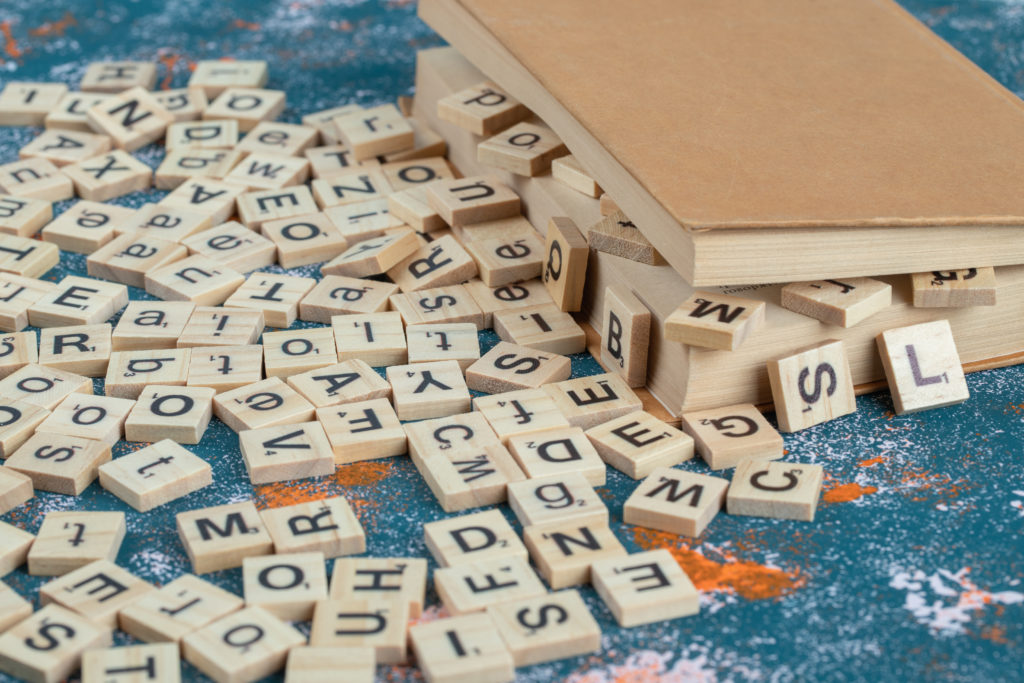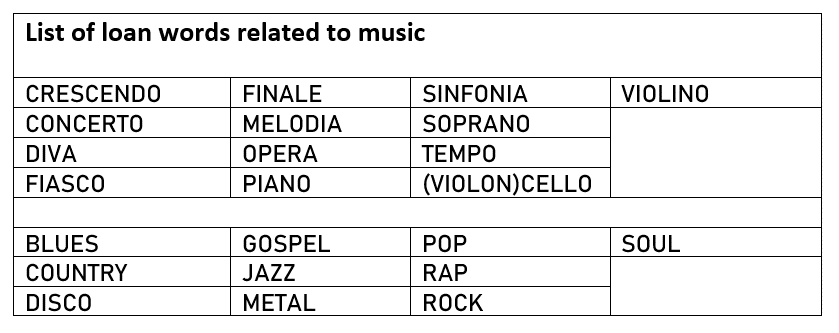I had the idea for this blog thinking about our students who have just begun their learning journey with us. However, it might benefit students of Italian at all levels. Learning a language can be quite challenging, and we are always searching for ways to make it easier and simpler for you. Today we are teaching you 50 Italian cognates to supercharge your learning.
In this article you’ll learn:
- Why learning cognates is a powerful strategy to learn Italian
- What is a cognate
- 50 basic cognates to start with
- How to identify cognates
- 7 categories of easily identifiable cognates
- What is a loan word
- Most common Italian loan words related to food
- Most common Italian loan words related to IT and social media
- Most common Italian loan words related to music
- Bonus: practice activity
- What is a false friend
- List of 10 most common false friends in Italian

The power of cognates
Working with cognates, which are words similar in both languages (in our case Italian and English) cannot only speed up your learning but also help with boosting your confidence.
So, I have compiled a list of 50 words that are similar (or identical) in English and Italian to show you how you can learn quickly some vocabulary and boost your Italian in a very short time.
Although I have promised 50 words, in fact I have added some other categories to help you widen your vocabulary with minimum effort.
These words that I have selected are either cognates or loan words and we’ll explain their difference.
The idea of this article however, is not only to provide you with a list of words, but also to empower you to make educated guesses about the meanings of words and to enable you to improvise words when you don’t have the Italian equivalent readily available.
When I mention improvisation, I am not referring to mere guessing. Instead, I’m suggesting that you tap into the extensive arsenal of your existing vocabulary in your own language (as well as other languages that you have already acquired).
As a bonus I have added an activity to practise this technique, with a short text in Italian. Which words can you identify even if you are a complete beginner? Can you guess the general meaning of it?
What is a cognate?
A cognate refers to a word in one language that is similar in both meaning, spelling and pronunciation to a word in another language. These similarities arise due to the common linguistic origins of the languages in question. The English language has been influenced by both Latin and French and that is why there are so many similarities between English and Italian.
For example, the English word “nature” and the Italian word “natura” are cognates because they have a common origin.
Cognates can be helpful when learning a new language, as they provide connections and shortcuts for understanding vocabulary and making educated guesses about word meanings even without prior knowledge of that language.
In summary two cognates
Look similar
Sound similar
Have the same meaning
50 basic cognates to start with
Here is your first list. This first list includes only nouns and are most frequently used in Italian:

How to identify cognates and understand more
Cognates are easily recognised also because in many instances have a similar ending, they can be group together, making it even easier to recognise them.
7 categories of easily identifiable Italian cognates
Let’s see some of the most common groups (includes adjectives and nouns):
- The ending -ante (English -ant)
- Brillante (brilliant)
- Costante (constant)
- Elegante (elegant)
- Esuberante (exuberant)
- Distante (distant)
- Dominante (dominant)
- Gigante (giant)
- Importante (important)
2. The ending -bile (English -ble)
- Accettabile (acceptable)
- Comprensibile (comprehensible)
- Compatibile (compatible)
- Flessibile (flexible)
- Incredibile (incredible)
- Inevitabile (inevitable)
- Orribile (horrible)
- Visible (visible)
3. The ending -ico (English -ic)
- Automatico (automatic)
- Basico (basic)
- Classico (classic)
- Comico (comic)
- Democratico (democratic)
- Economico (economic)
- Esotico (esotic)
- Fantastico (fantastic)
- Pubblico (public)
- Traffic (traffic)
4. The ending -ismo (English -ism)
- Attivismo (activism)
- Cinismo (cinism)
- Comunismo (communism)
- Meccanismo (mechanism)
- Ottimismo (optimism)
- Pacifismo (pacifism)
- Pessimismo (pessimism)
- Realismo (realism)
5. The ending -mente (English -ly)
- Completamente (completely)
- Direttamente (directly)
- Frequentemente (frequently)
- Generalmente (generally)
- Naturalmente (naturally)
- Probabilmente (probably)
- Raramente (rarely)
6. The ending -tà (English -ty)
- Autorità (authority)
- Comunità (community)
- Identità (identity)
- Opportunità (opportunity)
- Qualità (quality)
- Quantità (quantity)
- Serenità (serenity)
- Società (society)
7. The ending -zione (English -tion)
- The ending -zione (English -tion)
- Attenzione (attention)
- Communicazione (communication)
- Destinazione (destination)
- Educazione (education)
- Informazione (information)
- Organizzazione (organization)
- Reazione (reaction)
- Situazione (situation)

What are loan words?
Loan words are different from cognates as they have been borrowed directly from other languages. In some cases, is Italian that has taken from English (as in most of the IT words: computer, tablet, etc) and in some cases is English that has borrowed it from Italian (as in many words used in classical music and opera: concerto, sinfonia, etc).
To widen your vocabulary even more I have created some categories and prepared a list for each:
- Loan words related to food
- Loan words related to IT
- Loan words related to music
Loan words related to food

Are you interested in knowing more about Italian food vocabulary and etiquette? Click here to read more.
Loan words related to IT and social media

Loan words related to music

Would you like to know more about Italian words in music? Read here why Italian is the language of music.
Bonus: practice activity
As a bonus, I have added an activity to practise this technique with a short text in Italian. Can you identify the Italian cognates even if you are a complete beginner? Can you guess the general meaning of it?
- Read the following text and underline all the words that you can understand or that you think you understand. Remember you know more than you think.
- Based on these words, can you understand what this paragraph is about?
If you wish to get some feedback, share your answer on this post and I’ll comment LINK
Text
Che serata fantastica!
Ho organizzato una festa con gli amici a casa mia. Abbiamo ballato, riso e fatto fotografie. Tutti si sono divertiti e l’atmosfera era davvero incredibile. Abbiamo condiviso storie e momenti divertenti sui social media, e anche mangiato pizza e burger, c’era anche coca cola e birra. Abbiamo ascoltato musica e cantato insieme, creando un’atmosfera davvero speciale. È stato fantastico vedere tutti gli amici riuniti, e credo che questa sarà una delle serate più memorabili. Non vedo l’ora di organizzare la prossima festa!
What is a false friend?
False friends are a pair of words from two different languages that appear to be similar in spelling or pronunciation, but have different meaning.

List of very common false friends in Italian and English
1. Italian “attualmente” / English “actually”:
In Italian, “attualmente” means currently
while in English, “actually” means in fact or really.
2. Italian “camera” / English “camera”:
In Italian, “camera” typically refers to a room
while in English, it refers to a photographic device.
3. Italian “parenti” / English “parents”:
In Italian, “parenti” means relatives,
not just “parents” (mother and father) as it does in English.
4. Italian “sympathy” / English “simpatia”:
In Italian, “simpatia” means likability or charm,
while “sympathy” in English refers to a feeling of pity or compassion.
5. Italian “libreria” / English “library”:
In Italian, “libreria” means bookstore,
whereas in English, “library” refers to a place where books are kept for borrowing.
6. Italian “eventualmente” / English “eventually”:
In Italian, “eventualmente” means possibly or if necessary,
while “eventually” in English means finally or in the end.
7. Italian “annoiare” / English “annoy”:
In Italian, “annoiare” means to bore or to tire,
while annoy in English means to irritate or bother.
8. Italian “fattoria” / English “factory”:
In Italian, “fattoria” means farm,
while “factory” in English refers to a place where goods are produced.
9. Italian “pavimento” / English “pavement”:
In Italian, “pavimento” means floor or flooring,
while “pavement” in English refers to the hard surface of a road or sidewalk.
10. Italian “argomento” / English “argument”:
In Italian, “argomento” means topic or subject,
whereas in English, “argument” refers to a disagreement or a reason presented in support of an idea.
Check out our YouTube channel HERE for more practice.
Conclusion:
In summary, learning Italian might seem tough, but using similar words (cognates and loan words) can make it easier. These words link English and Italian and help you guess meanings. This blog gave you 50 Italian cognates (and more) to start with and strategies to encouraged you to guess meanings confidently.
Remember, some words might look the same but mean different things (false friends). So, be careful and start learning some of the most common.
In a nutshell, this blog isn’t just about words. It’s a key to exploring language deeply, connecting cultures, and broadening your experiences. Whether you’re new to Italian or experienced, cognates, loan words, and lessons from false friends are useful tools for your language journey.
Enjoy the ride!
Laura
Feel free to download the concise version of this blog in a PDF file here.







